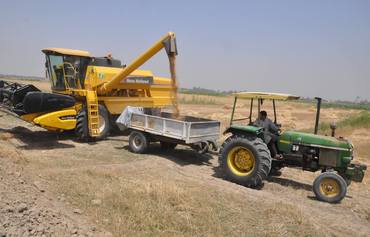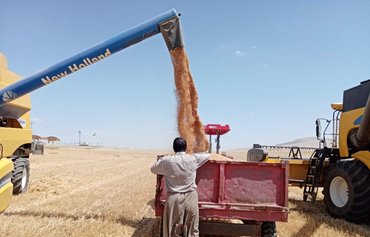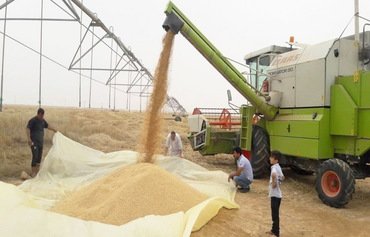Iraq is working to revive agricultural production in areas liberated from the "Islamic State of Iraq and the Levant" (ISIL) and to cultivate the national production of strategic crops such as wheat and barley.
In a directive issued June 22nd, the Ministry of Agriculture announced it was facilitating the receipt of wheat and barley from all farmers in liberated areas by opening silos that will serve as collection and marketing outlets.
Two main outlets have been opened in Zammar and Rabia in Ninawa province, and efforts are under way to open more outlets in other liberated areas, ministry spokesman Hamid al-Naif told Mawtani.
The wheat and barley marketing season in Iraq typically begins in May and lasts around three months, he added.
In co-ordination with the Iraqi forces, the ministry has secured the safe passage of trucks transporting crops to these storage sites and has been conducting laboratory tests to ensure the quality and freshness of the produce upon their arrival.
Ministry has 'spared no effort'
The ministry "has spared no effort in helping farmers, especially in liberated areas, to revitalise their farmland and improve the level of production of all crops", al-Naif said.
"In light of our development strategy, we have made it possible to receive agricultural loans to reactivate agricultural projects," he said, noting that these are available for both livestock and agricultural crops.
Fertilisers and feed are being offered at discounted prices, he said, in addition to advanced irrigation systems and ploughing, fertilising and harvesting machinery.
The ministry also has provided electricity and water for irrigation to agricultural projects, maintained irrigation plants, and cleaned canals and other agriculture infrastructures, al-Naif said.
"We are moving towards enhancing reconstruction and reviving our agriculture sector," he added.
Agricultural production hit hard
ISIL fighters overran large swaths of Diyala province in June 2014, provincial agriculture department head Mohammed Najib told Mawtani.
"Terrorists had managed to overtake large parts of the province, consisting mostly of orchards and agricultural fields, before the security forces were able to drive them out and liberate the entire territory at the end of that year," he said.
That led to major agricultural losses, he added, "but in joint efforts with the local government we have managed to overcome many challenges and have restored life to Diyala's agriculture".
"Thanks to hard work, we managed this year to produce more than 200,000 tonnes of wheat and 35,000 tonnes of barley," Najib said.
"Those quantities, which are now being marketed to warehouses, cover the total need of the province," he added.
Various types of support to farmers
"We are going according to a work plan focused on supporting farmers with seeds, agricultural equipment and fertilisers, and we are now preparing to provide them with 40,000 tonnes of urea and diammonium phosphate (DAP)," Najib said, explaining that these are fertilisers used in wheat farming.
The department is working to provide water quotas to farmers according to fair distribution schedules, he added.
It has started to implement the ministry's decision to postpone the collection of debt owed by farmers who were affected by ISIL-related violence in order to encourage them to cultivate their farmland, he said.
Iraqi MP Farid al-Ibrahimi, who serves on the parliamentary agriculture committee, described the effort to help farmers as "an important initiative that can help erase the negative effects on the agricultural sector left by terrorism".
Diyala farmer Mukhlef al-Azzawi, 64, of al-Azim district, told Mawtani the agriculture department in his province has made "arduous" efforts to ensure the successful marketing of the wheat crop.
"They helped us transport our crops by providing security to the cargo trucks and facilitating testing procedures," he said."Before that, they offered us all the support and attention in the restoration of our farmland."

![A truck is loaded with wheat, which will be marketed in Diyala under a Ministry of Agriculture initiative to facilitate the sale of produce from liberated areas. [Photo courtesy of Diyala Media Facebook page]](/cnmi_di/images/2016/06/30/5686-Iraq-farmers-produce-600_384.jpg)






